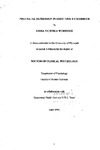POST-NATAL DEPRESSION IN FIRST TIME FATHERHOOD
| dc.contributor.author | WORWOOD, EMMA VICTORIA | |
| dc.contributor.other | School of Psychology | en_US |
| dc.date.accessioned | 2013-10-24T09:47:59Z | |
| dc.date.available | 2013-10-24T09:47:59Z | |
| dc.date.issued | 1999 | |
| dc.identifier | NOT AVAILABLE | en_US |
| dc.identifier.uri | http://hdl.handle.net/10026.1/2340 | |
| dc.description.abstract |
It is gradually becoming acknowledged that fathers do suffer from post-natal depression, but very little is known about their experience or how many fathers are actually affected. The factors that may increase a father's susceptibility to post-natal depression, or those that might indeed protect him, have also been given little consideration in research to date. This study examined the prevalence and comorbidity of post-natal depression in 100 first time parents, using the Edinburgh Post-natal Depression Scale (EPDS). The psychological factors of infant temperament, perception of own parenting and social support were investigated in a smaller sample of 30 fathers subsequently interviewed. These were measured using the Neonatal Perception Inventory (NPI), the Parental Bonding Instrument (PBI) and the Significant Others Scale (SOS) respectively. The findings suggest that approximately 12 per cent of first time fathers may suffer from post-natal depression and fathers are significantly more likely to experience this if their partner is also depressed. Depression amongst fathers was found to be associated with having little social support, perceiving one's own baby as more difficult than the average baby and perceiving one's own father as having been uncaring. The findings are discussed together with their clinical implications and areas for future research. | en_US |
| dc.description.sponsorship | Southmead Health Services N.H.S. Trust | en_US |
| dc.language.iso | en | en_US |
| dc.publisher | University of Plymouth | en_US |
| dc.title | POST-NATAL DEPRESSION IN FIRST TIME FATHERHOOD | en_US |
| dc.type | Thesis | |
| dc.identifier.doi | http://dx.doi.org/10.24382/3963 | |
| dc.identifier.doi | http://dx.doi.org/10.24382/3963 |
Files in this item
This item appears in the following Collection(s)
-
01 Research Theses Main Collection
Research Theses Main


